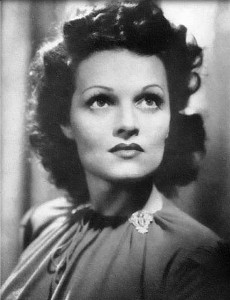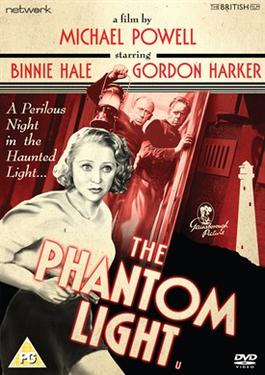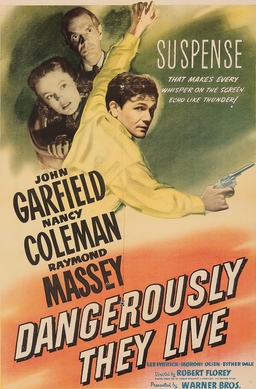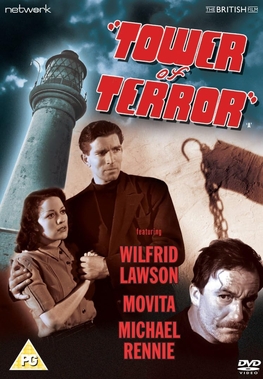
Foreign Correspondent is a 1940 American black-and-white spy thriller film directed by Alfred Hitchcock. It tells the story of an American reporter based in Britain who tries to expose enemy spies involved in a fictional continent-wide conspiracy in the prelude to World War II. It stars Joel McCrea and features 19-year-old Laraine Day, Herbert Marshall, George Sanders, Albert Bassermann, and Robert Benchley, along with Edmund Gwenn.

The Battle of Heligoland Bight was the first Anglo-German naval battle of the First World War, fought on 28 August 1914, between ships of the United Kingdom and Germany. The battle took place in the south-eastern North Sea, when the British attacked German patrols off the north-west German coast. The German High Seas Fleet was in harbour on the north German coast while the British Grand Fleet was out in the northern North Sea. Both sides engaged in long-distance sorties with cruisers and battlecruisers, with close reconnaissance of the area of sea near the German coast—the Heligoland Bight—by destroyer.

Owen Chase was first mate of the whaler Essex, which sank in the Pacific Ocean on November 20, 1820, after being rammed by a sperm whale. Soon after his return to Nantucket, Chase wrote an account of the shipwreck and the attempts of the crew to reach land in small boats. The book, Narrative of the Most Extraordinary and Distressing Shipwreck of the Whale-Ship Essex, was published in 1821 and would inspire Herman Melville to write Moby-Dick.

Oliver Twist is a 2005 drama film directed by Roman Polanski. The screenplay by Ronald Harwood adapts Charles Dickens's 1838 novel of the same name. It is an international co-production of the United Kingdom, the Czech Republic and France.

In Enemy Hands is a 2004 American submarine film directed by Tony Giglio and starring William H. Macy, Til Schweiger, Thomas Kretschmann, Scott Caan and Lauren Holly. The film follows an American submarine crew getting captured by a German submarine crew and taken prisoner aboard their U-boat.

Back-Room Boy is a 1942 British comedy mystery film directed by Herbert Mason, produced by Edward Black for Gainsborough Pictures and distributed by General Film Distributors. The cast includes Arthur Askey, Googie Withers, Graham Moffatt and Moore Marriott. It marked the film debut of Vera Frances. The original story was written by J.O.C. Orton, Marriott Edgar and Val Guest. A man from the Met Office is sent to a lighthouse on a remote Scottish island to monitor the weather, where he hopes to escape from women, but soon finds the island overrun by them.

Florence Lindon-Travers, known professionally as Linden Travers, was a British actress.

The Raid on Scarborough, Hartlepool and Whitby on 16 December 1914 was an attack by the Imperial German Navy on the British ports of Scarborough, Hartlepool, West Hartlepool and Whitby. The bombardments caused hundreds of civilian casualties and resulted in public outrage in Britain against the German Navy for the raid and the Royal Navy for failing to prevent it.

Dark Journey is a 1937 British spy film directed by Victor Saville and starring Conrad Veidt, Vivien Leigh and Joan Gardner Written by Lajos Bíró and Arthur Wimperis, the film is about two secret agents on opposite sides during World War I who meet and fall in love in neutral Stockholm.

No Orchids for Miss Blandish is a 1948 British gangster film adapted and directed by St. John Legh Clowes from the 1939 novel of the same name by James Hadley Chase. It stars Jack La Rue, Hugh McDermott, and Linden Travers, with unbilled early appearances from Sid James, as a barman, and Walter Gotell, as a nightclub doorman. Due to the film's strong violence and sexual content for its time, amongst other reasons, several critics have called it one of the worst films ever made.

Non-Stop New York is a 1937 British science fiction crime film directed by Robert Stevenson and starring John Loder, Anna Lee and Francis L. Sullivan. It is based on the 1936 novel Sky Steward by Ken Attiwill. A woman who can clear an innocent man of the charge of murder is pursued by gangsters onto a luxurious transatlantic flying boat.

Satan's Triangle is a 1975 American made-for-television mystery horror film directed by Sutton Roley and produced by ABC. The plot involves a United States Coast Guard helicopter sent to answer a distress call from inside the Bermuda Triangle.

The Phantom Light is a 1935 British crime film, a low-budget "quota quickie" directed by Michael Powell and starring Binnie Hale, Gordon Harker, Donald Calthrop, Milton Rosmer and Ian Hunter. The screenplay concerns criminals who try to scare a new chief lighthouse keeper on the Welsh coast, in an attempt to distract him from their scheme.

Beware of Pity is a 1946 British romantic drama film directed by Maurice Elvey and starring Lilli Palmer, Albert Lieven and Cedric Hardwicke. It is based on the 1939 novel of the same name by Stefan Zweig. A paraplegic young baroness mistakes compassion for love. The film's costumes were designed by Cecil Beaton. It was made by Two Cities Films at Islington Studios. The film was not a great popular success outside the Soviet Union.

Ten Days in Paris, also known as Missing Ten Days and Spy in the Pantry, is a 1940 British spy film directed by Tim Whelan and starring Rex Harrison, Kaaren Verne and C. V. France. The screenplay concerns a man in Paris who turns out to be a doppelganger of a spy operating in the French capital.

Dangerously They Live is a 1941 American World War II spy thriller film directed by Robert Florey and starring John Garfield, Nancy Coleman and Raymond Massey. The plot concerns Nazi spies who try to pry information out of a British agent.

Mass Effect: Paragon Lost is a 2012 American-Japanese adult animated science fiction action film set in the Mass Effect science fiction universe during the events of Mass Effect 2. It is produced by BioWare, FUNimation, T.O Entertainment and animated by Production I.G. The film was screened in select theaters on November 29, 2012. It was released for digital download on Xbox Live and PlayStation Network on December 14, 2012, and on DVD and Blu-ray on December 28, 2012.

In the Heart of the Sea is a 2015 historical adventure drama film directed and co-produced by Ron Howard from a screenplay by Charles Leavitt and a story by Leavitt, Rick Jaffa, and Amanda Silver. An international co-production between the United States and Spain, the film stars Chris Hemsworth, Benjamin Walker, Cillian Murphy, Tom Holland, Ben Whishaw, and Brendan Gleeson. It is based on Nathaniel Philbrick's 2000 non-fiction book In the Heart of the Sea: The Tragedy of the Whaleship Essex, about the sinking of the American whaling ship Essex in 1820, an event that in part inspired Herman Melville's 1851 novel Moby-Dick.

Tower of Terror is a 1941 British wartime thriller film directed by Lawrence Huntington and starring Wilfrid Lawson, Michael Rennie and Movita. It was made at Welwyn Studios with location shooting on Flat Holm off the Welsh coast.

The Dark Light is a 1951 British second feature thriller film directed and written by Vernon Sewell and starring Albert Lieven, David Greene and Norman Macowan.




















